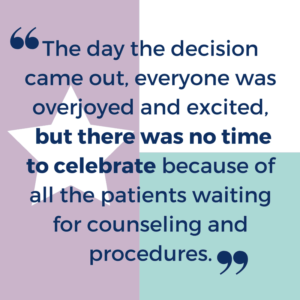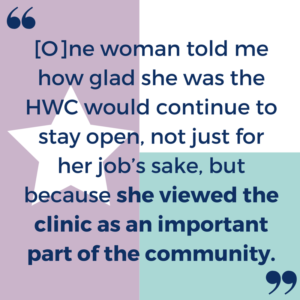By Liza Brecher
In June, I started my Reproductive Health Externship (RHE) at Houston Women’s Clinic in Houston, Texas. Houston Women’s Clinic (HWC) is a standalone abortion clinic (not an ambulatory surgical center) and is one of eleven clinics left in the state. When I was setting up my externship with Kathy, the clinic manager, we discussed the Whole Woman’s Health v. Hellerstedt case. Kathy let me know that if Whole Women’s Health lost the case, the clinic would close. We planned for me to start on June 1st so that I could spend as much time as possible in the clinic before the Supreme Court made a ruling.
In those first few weeks, I spent time with the counselors, ultrasound technicians, nurses, and observing the doctor in the procedure rooms. Every single day, the clinic was operating at the peak of its capacity as women came from all over Texas and Louisiana to receive abortion care.
While the staff was clearly focused on serving our patients, there was an undercurrent of fear for the clinic’s future. They told me how they had to close for over a week until HB2 was suspended and how stressful it had been to have their jobs hanging in limbo. Everyone was worried that the clinic may have to shut down, and it was unclear if they would be able to move to a surgical center to keep providing abortion care. The staff aimed to hide these concerns from patients, but I remember when a patient needed to schedule her procedure for the third week of June, no one knew if the clinic would still be open then.
I took a hiatus from my externship at the end of June, but after the Supreme Court released its decision, Kathy invited me to come back for the rest of the summer. Since I’ve been back at HWC I have been talking to the staff about the SCOTUS decision and what it means to them. The day the decision came out, everyone was overjoyed and excited but there was no time to celebrate because of all the patients waiting for counseling and procedures. A celebratory cake was brought in for lunch, but nobody got a piece until after the last patient left that afternoon. The SCOTUS ruling was exciting because it reaffirmed abortion rights, but it also meant everyone at HWC could breathe easier knowing they would be keeping their jobs.
One aspect of the fight against TRAP laws and abortion restrictions I don’t see discussed very much is how they impact the nurses and staff who work at abortion clinics. The lack of job security that follows the litigation of TRAP laws puts incredible stress on clinic employees whose jobs are stressful enough already. It was deeply gratifying to see these incredible women who have taught me so much able to stop worrying about losing their jobs at a moment’s notice.
When I discussed the SCOTUS ruling with the staff, one woman told me how glad she was the HWC would continue to stay open, not just for her job’s sake, but because she viewed the clinic as an important part of the community. She told me about driving two of her friends to the clinic to get abortions when she was in high school. One of the nurses told me she was happy that the ruling finally showed an understanding that surgical regulations are medically unnecessary for abortion care and that she hoped more clinics will re-open, especially on the gulf coast of Texas and in Louisiana.
One woman who has worked at the clinic since the early 1980s was amazed at how few patients knew about the WWH v. Hellerstedt case at all! On June 27th, the day of the Whole Woman’s Health decision, the nurses and medical assistants in the procedure rooms applauded the doctor as he came in to perform the first abortions of the day. Afterwards, a medical assistant told me that patients asked her if they clapped every day, not knowing about the case at all.
Though we celebrated after work that day at a Planned Parenthood rally, since then it’s just been busy as usual at HWC. We still have nearly 100 patients a day coming in for counseling and procedures who make the trek from all over Texas and Louisiana to access safe, compassionate abortion care. I try to make a point of talking to patients about their rights and encouraging them to be more politically active. When someone comments about how crowded the clinic is, I make sure to tell them that back when Texas had 41 clinics, crowding wasn’t such a problem. Now that we are only one of 11, we have many more patients. Hopefully, thanks to the SCOTUS ruling, more clinics will open back up and women will be able to access abortion care closer to home. Until that happens, Houston Women’s Clinic’s doors will be wide open.

